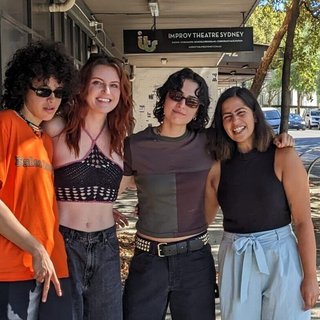One year after being dropped from their major label for “not being profitable enough,” MUNA was signed to Phoebe Bridgers’ imprint, Saddest Factory. Two years after being dropped they released their third, self-titled album that charted in the US, UK, and Aus. Three years after being dropped, MUNA played alongside Ava Max and Kim Petras to a sold-out crowd of 15,000 people at the closing ceremony of Sydney WorldPride, opened for Lorde, and got booked to tour the US alongside Taylor Swift.
The American electro pop trio’s story is a queer music comeback for the ages. Freed for the time from the feast or famine nature of the industry, Katie, Josette and Naomi are in their hotgirl wellness era, and are taking the time to reflect and celebrate life. They swung by the studio for Lunch with Tanya Ali last week to chat about their latest album, self-care on tour, and navigating the world as queer artists.
Despite two already under their belt, it wasn’t until MUNA’s third album, their self-titled project released in June 2022, that they really broke into the mainstream.
“It’s fun for this to be the record that a lot of people are learning about us through, because it’s such a diverse sounding album.”
The record explores a broad sonic palette, folding in influences of synth-pop, country-folk, and disco into MUNA’s anthemic electronic sound. Now in their 10th year, it feels like the next step in the trio’s arc, the genesis of which came from leaving RCA Records after seven years and signing to Phoebe Bridgers’ label, Saddest Factory Records during the pandemic.
“The relationship was super easy from the jump because she doesn’t want to control what we’re doing at all.”
Already a fan of their past work, Phoebe (“Yes, big daddy.” “Small daddy, almost.” “Love daddy though.”) encouraged MUNA to trust their instincts and their process. Working together for so long has imbued the trio with a sense of cohesion. It makes space for each of them to trust and comfortably explore themselves.
Mental health (both highs and lows) is a recurring theme in MUNA’s music. It’s also something they remain very mindful of when touring. Taking care of each other on the road involves all the usual hallmarks of LA wellness: regular exercise, spending time in the sun, skin care, and quality time with each other. Rest is also essential to keeping a good headspace.
“Everyone’s like ‘what are you doing after the show?’ and it’s like… ‘nothing, babe.’ Tucked up to my neck in bed, hopefully dead asleep, in about 45 minutes.”
A sentiment often echoed by other artists, MUNA shared that the predictable schedule of touring brings with it a sort of stability and sense of immediate purpose that helps keep the trio feeling balanced.
“When you have a show day you have just the one job you have to fulfil, and it kind of makes that existential question of ‘what is the meaning of life’ go away, temporarily. Because you’re just like, my purpose is to do this show.”
Another underlying theme on the album is joy, more specifically queer joy. From the repeated refrain of “Life’s so fun, life’s so fun” in album’s opening track ‘Silk Chiffon’ (featuring big boss Phoebe Bridgers) to the self-reclaiming shouts of “Anything you need, anything but me” on the buoyantly groovy “Anything but Me”, the project captures the unabashed, earnest happiness of living as your authentic self.
“It’s important to show up and say we’re really happy in our lives, we’re happy that we’ve come out.”
In 2023 queer joy really is an act of resistance, and while MUNA recently performed at Sydney WorldPride in (a slightly artificial) celebration of LGBTQIA+ identities, they stressed the importance of appreciating just how hard the community has worked to attain the rights and freedoms they have today. They also called out the continuing hate and violence directed against more vulnerable members of the community, including trans women of colour.
“We want everybody to be safe, we want everybody to be themselves… I just want [everybody] to be free and to be attracted to whoever [they] want to be attracted to.”
It’s a messy world out there, and the future is uncertain at best for a lot of queer people right now. Survival can take many forms, and for MUNA right now it’s about seizing every opportunity to live life to the fullest, while taking care of themselves and their community.
“Play good shows, make good music, be good friends, and not want to die.”
Words by Giana Festa
